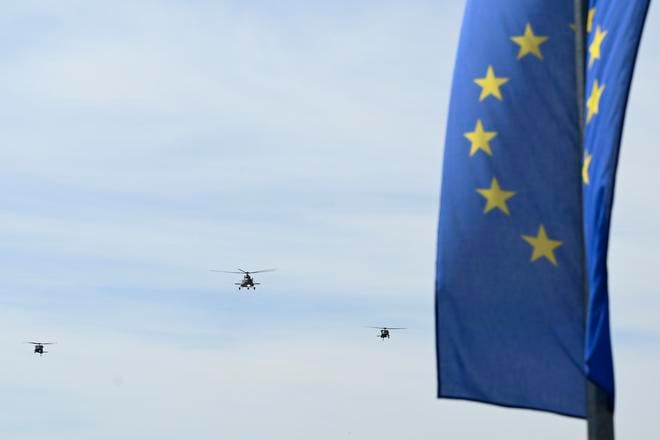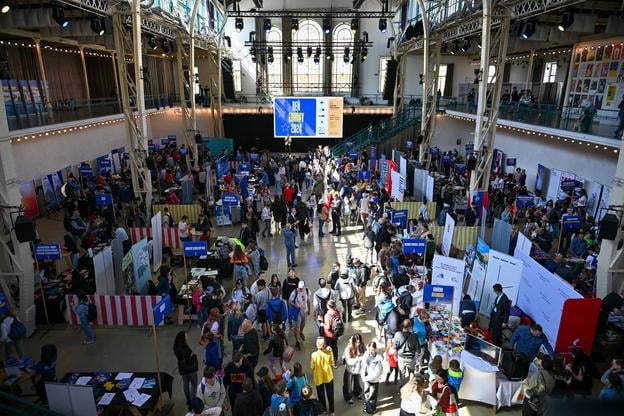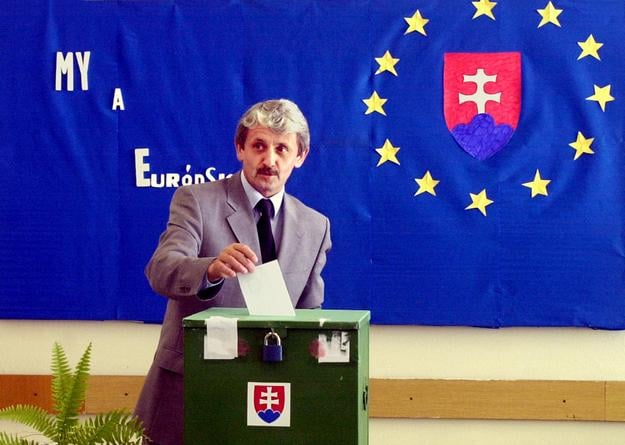Twenty-one years after joining the European Union — on 1 May 2004 — Slovakia finds itself at a crossroads. While membership has brought economic growth, billions in investment and a sense of security in uncertain times, national leaders and political parties remain deeply divided on how the country should shape its future in Europe.
“For 21 years, we have been part of Europe, built on freedom, democracy, peaceful coexistence and respect for human dignity,” Radim Dvořák, acting head of the European Commission’s Representation in Slovakia, told the TASR news agency on 1 May. He added that the EU has helped deliver stability and prosperity, but warned that unity and cooperation should not be taken for granted.
Since 2004, Slovakia has received more than €38 billion in EU funding, supporting hundreds of projects, ranging from schools and hospitals to roads, railways and science parks. According to the Commission, Slovakia’s gross national income has grown by an average of 7 percent annually, with GDP per capita rising from 59 percent of the EU average in 2004 to 71 percent by 2022.
President Peter Pellegrini struck a more sombre tone. “We are witnessing global changes at a pace unseen for decades. The world is shifting, and the rules of the past are being rewritten,” he said, as quoted by TASR. For vulnerable nations like Slovakia, he argued, EU membership offers essential protection. Yet Pellegrini also criticised the bloc’s shortcomings, including “excessive bureaucracy” and bold but impractical initiatives. Despite this, he called the EU “our civilisational anchor and security space”, urging Slovaks to embrace their place at the table while advocating for reforms.
According to a Eurobarometer survey conducted in December, 53 per cent of Slovaks said they trust the European Union, while two-thirds described themselves as feeling connected to it.
The debate over Slovakia’s role in the EU is, however, far from settled. The ruling Smer party took a sharper stance, calling for a return to sovereign cooperation between member states and rejecting what it sees as centralised decision-making and unrealistic green policies. It warned that scrapping the national veto could marginalise smaller countries, turning them into “mere statisticians” in the European project.
“Without the veto, Slovakia and similar states would become irrelevant,” the party stated, as quoted by TASR. Smer, which refers to European leaders supporting Ukraine militarily as warmongers, also called on the EU to prioritise peace and diplomacy in foreign affairs, warning that the bloc risks losing its identity as a force for peace. The Smer-led government also backs Ukraine militarily, though through commercial contracts rather than donations from its own armed forces.
Progressive Slovakia, by contrast, adopted an overtly pro-European position. MEP Martin Hojsík said the EU must become a true global power, ready for enlargement towards Ukraine and the Western Balkans, and strengthen its defence. He urged institutional reform, including reducing the use of vetoes in foreign policy, and argued for a more robust EU budget. “We need an EU ready to defend itself and protect democracy,” Hojsík told TASR, warning that Slovakia risks being sidelined in common defence plans.
Michal Šimečka, leader of Progressive Slovakia, has warned that the country’s place in the European Union is no longer guaranteed, as leading political figures continue to question its value. He argued that the nation should act as a strong and constructive partner in Brussels — a role he believes it is failing to fulfil. “Today, 21 years after joining the European Union, Slovakia finds itself in perhaps its weakest position yet,” Šimečka said, as quoted by TASR. “We are isolated. Our only ally is Hungary’s Prime Minister Viktor Orbán. Together, we are seen as problem members of the EU.”
The truth is, Prime Minister Fico rarely travels to meet European partners, and few of them come to Slovakia.
The Slovensko movement voiced a more cautious, pragmatic view. Former MEP Peter Pollák said maintaining the veto is key to equality between large and small countries, but stressed that it should not paralyse the EU. “In matters of defence and security, decisions must be made quickly,” he noted, adding that Slovakia must strengthen its defence industry and deepen ties within Europe as US security guarantees become less certain.
Hlas, a key coalition party, firmly rejected any notion of leaving the EU. “The EU is our living space,” party leader and Interior Minister Matúš Šutaj Eštok told TASR. “For Hlas, leaving is a red line.” He stressed that while Slovakia should not be subservient, it must remain a constructive and responsible member.
In recent months, Slovakia has seen protests under the banner “Slovakia is Europe”, sparked by remarks in January from Deputy Speaker of Parliament Tibor Gašpar (Smer), who suggested the country might one day leave the European Union.
For KDH leader Milan Majerský, EU membership remains vital despite its flaws. “Slovakia is financed by EU funds, and Europe stands for human dignity and freedom,” he told TASR, though he lamented Slovakia’s lack of leadership on key EU issues. Majerský rejected anti-EU rhetoric, saying those advocating departure are harming the country.


 A helicopter flyover near the village of Brezová pod Bradlom in the Myjava district on Saturday, 4 May 2024. (source: TASR - Radovan Stoklasa)
A helicopter flyover near the village of Brezová pod Bradlom in the Myjava district on Saturday, 4 May 2024. (source: TASR - Radovan Stoklasa)
 Europe Day in Bratislava (source: TASR - Pavol Zachar)
Europe Day in Bratislava (source: TASR - Pavol Zachar)
 Slovak Prime Minister Mikuláš Dzurinda casts his ballot at a polling station in Bratislava, Slovakia, on Friday, 16 May, 2003, during the Slovakia's referendum on joining the European Union. (source: TASR - Štefan Puškáš)
Slovak Prime Minister Mikuláš Dzurinda casts his ballot at a polling station in Bratislava, Slovakia, on Friday, 16 May, 2003, during the Slovakia's referendum on joining the European Union. (source: TASR - Štefan Puškáš)